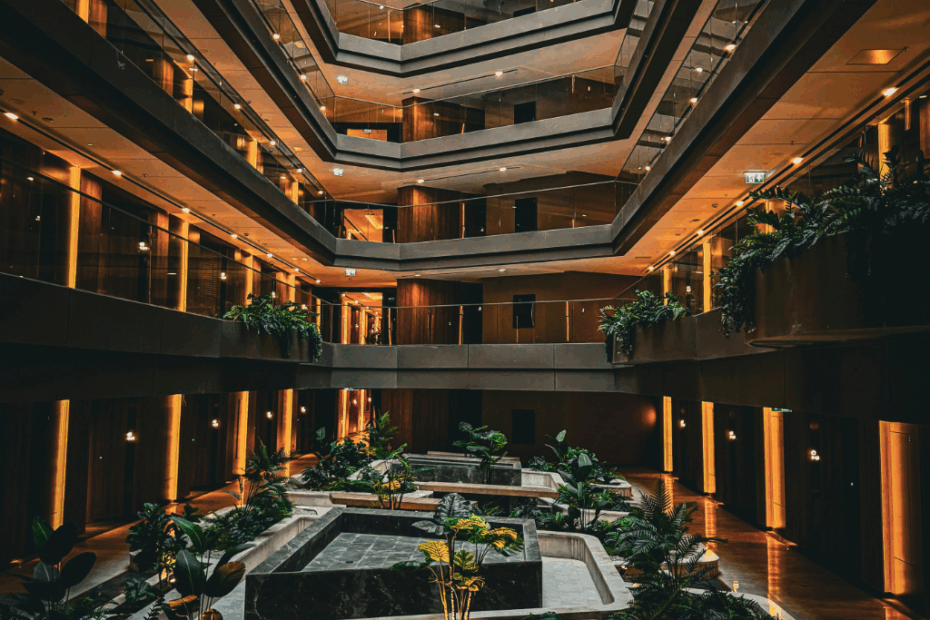Renovating a hotel in 2026 will likely require careful planning, especially as labor shortages and supply chain delays continue to affect the construction industry.
For hotel owners and decision makers, understanding how to mitigate these challenges is essential to ensure projects stay on schedule, within budget, and maintain guest satisfaction.
With experience as trusted hotel renovation general contractors, Kapella Group helps operators navigate these challenges through strategic planning, proactive communication, and efficient execution.
Start with Comprehensive Pre-Planning
Effective hotel renovations start long before the first demo begins. Begin by clearly defining the scope of work: identify which guest rooms, public spaces, or back-of-house areas will be updated and what systems or finishes need to be replaced. Prioritize work based on operational impact and potential ROI.
Next, engage your construction team early. Experienced hotel renovation general contractors like Kapella Group can help anticipate labor and material bottlenecks, suggest alternative solutions, and identify critical long-lead items.
Pre-ordering materials such as furniture, finishes, or mechanical equipment well in advance can help avoid costly delays. Proper pre-planning also allows owners to identify potential scheduling conflicts, seasonal occupancy patterns, and high-demand periods that could affect both labor availability and guest experience.
Develop a Phased Renovation Approach
When labor and materials are limited, a phased renovation plan can reduce disruptions and increase flexibility. Breaking the project into smaller, manageable phases allows for work to progress even if certain resources are delayed.
For instance, public area upgrades can be completed before guest room renovations, or different floors can be scheduled in overlapping rotations to maintain operations while work continues.
Phasing also enables better cost control. By focusing on priority areas first, hotel owners can allocate resources efficiently and avoid tying up funds on non-critical components that may be affected by material shortages.
Kapella Group’s expertise in CapEx and occupied renovations ensures that each phase is executed with minimal disruption, safeguarding both revenue and guest satisfaction.
Mitigate Labor Challenges
Labor shortages are a major concern for construction projects in 2026. To address this, work with contractors who maintain strong relationships with trade partners and have access to skilled labor pools.
Reliable hotel renovation general contractors can identify which tasks are most labor-intensive and plan accordingly, possibly adjusting work sequences or using prefabricated assemblies to reduce onsite labor needs.
Cross-training staff and leveraging specialized subcontractors can also help address gaps in the workforce. Kapella Group’s team routinely coordinates multiple trades simultaneously, ensuring that even in tight labor markets, projects continue to progress smoothly.
Effective labor planning also involves clear communication with your project manager, subcontractors, and hotel operations team to anticipate scheduling conflicts and adjust timelines proactively.
Secure Materials and Manage Supply Chains
Material delays and cost fluctuations can derail hotel renovations if not managed carefully. Begin by identifying long-lead items early and placing orders as soon as possible. For materials subject to global supply constraints, such as HVAC equipment, luxury finishes, or custom millwork, consider alternatives that meet brand standards but are more readily available.
Working with an experienced renovation team also means having established supplier networks and contingency plans. Kapella Group regularly coordinates material sourcing, delivery logistics, and inventory tracking to minimize delays. Maintaining flexibility and monitoring supply chain updates allows for proactive adjustments without sacrificing quality or design intent.
Maintain Open Communication
A successful hotel renovation depends on transparent and frequent communication between all parties: owners, property managers, contractors, and design teams. Regular check-ins, progress updates, and contingency planning meetings ensure that everyone is aligned and can respond quickly to unexpected delays.
Occupied renovations, in particular, require careful coordination to minimize impact on guests and staff. Kapella Group’s approach includes clear signage, scheduled noise work during off-peak hours, and constant oversight to ensure safety and comfort remain a priority. This attention to communication builds trust with hotel operators and ultimately enhances the guest experience.
Plan for Contingencies
Even with the best planning, unforeseen challenges may arise. Establish contingency plans for labor shortages, material delays, or sudden price increases. This could include flexible work schedules, pre-ordered backup materials, or alternative suppliers. Budgeting a contingency fund for these scenarios ensures that projects can continue without major financial or operational disruptions.
